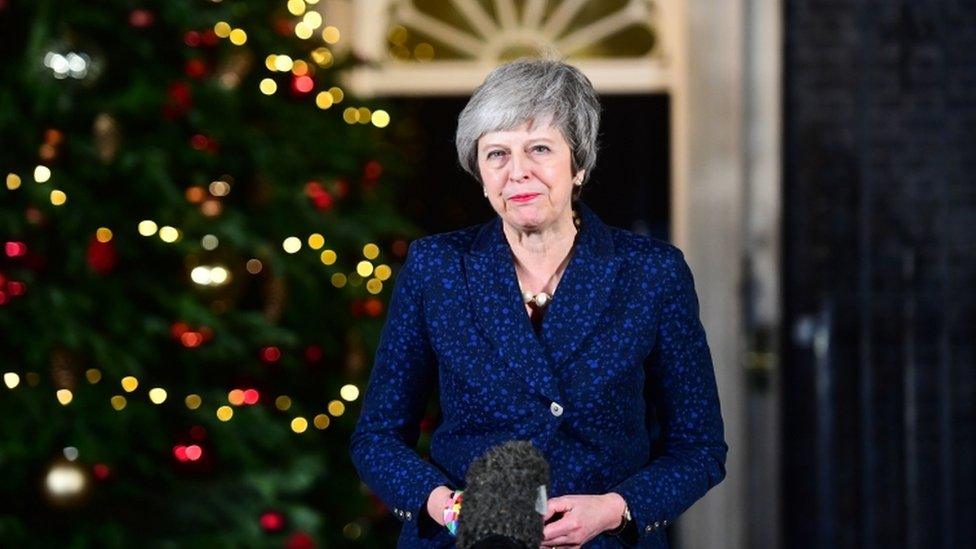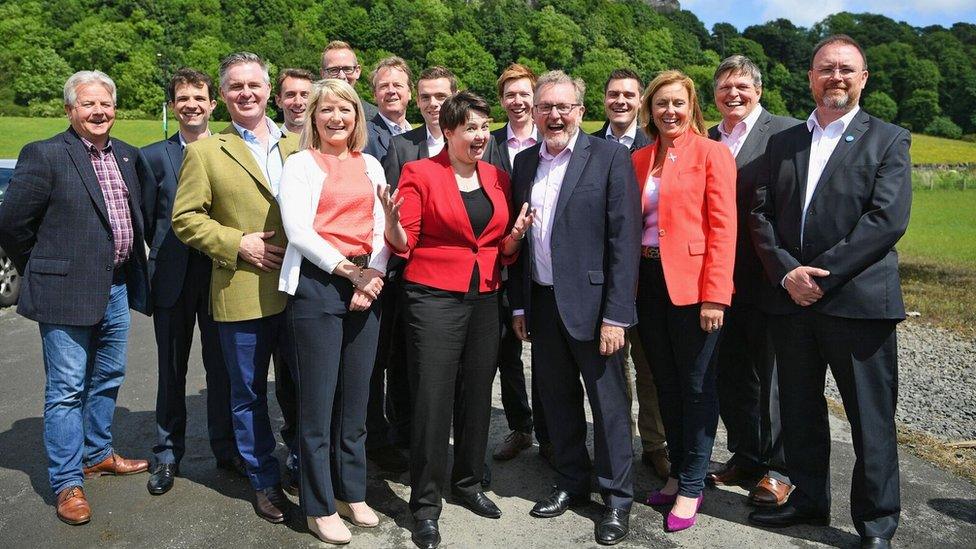David Mundell says Theresa May victory was 'convincing'
- Published

Mrs May acknowledged that a large number of her MPs had voted against her
The Scottish secretary has welcomed the prime minister's victory in a confidence vote despite 117 of her party's 317 MPs voting against her.
David Mundell claimed Theresa May had won "convincingly" and it was now time to "get on with delivering an orderly exit from the EU".
Eleven of the 13 Scottish Conservative MPs said they would be voting for Mrs May ahead of the secret ballot.
Scottish Tory leader Ruth Davidson also gave Mrs May her "full support".
The prime minister won the vote of Conservative MPs by 200 to 117 on Wednesday evening, with the result being greeted by cheers and applause as it was announced by backbench Tory chairman Sir Graham Brady.
Speaking outside 10 Downing Street a short time later, Mrs May accepted that a "significant" number of Tory MPs had voted against her but said she now wanted to "get on with the job" and deliver the Brexit "that people voted for"
But leading Brexiteers including Jacob Rees-Mogg immediately said it was a "terrible result" for the prime minister and called for her to stand down.
Scotland's first minister, Nicola Sturgeon, said the prime minister's authority had been "fatally undermined".
And the BBC's political editor Laura Kuenssberg said the margin of victory was "not at all comfortable" for Mrs May and a "real blow" to her authority.
Allow X content?
This article contains content provided by X. We ask for your permission before anything is loaded, as they may be using cookies and other technologies. You may want to read X’s cookie policy, external and privacy policy, external before accepting. To view this content choose ‘accept and continue’.
Ahead of the ballot, Mrs May told her MPs she would not lead the party into the next general election in 2022.
Opponents of the prime minister are angry at the Brexit deal she has struck, which they argue will keep the UK tied to the EU indefinitely with no say over its rules and unable to strike trade deals around the world.
Anger has focused on the so-called "backstop" to prevent the return of a physical border in Northern Ireland.
The prime minister still faces a battle to get the Brexit deal through the UK Parliament, with all opposition parties and dozens of her own MPs against it.
There were cheers from Tory MPs as the result was announced
Ahead of the result being announced, Mr Mundell said the vote would allow the prime minister's critics to "have their moment" but that "after the vote has taken place and the prime minister is shown to have the confidence of a majority of MPs we will have to get back to the business of delivering Brexit".
Mr Mundell added: "The reality is we're leaving the EU - we needed to get a deal, we've got a deal, it's the best deal available.
"Just because you don't like things doesn't make them go away."
Allow X content?
This article contains content provided by X. We ask for your permission before anything is loaded, as they may be using cookies and other technologies. You may want to read X’s cookie policy, external and privacy policy, external before accepting. To view this content choose ‘accept and continue’.
The position of two Scottish Conservative MPs - Ross Thomson and Douglas Ross - was not known before the vote, but both have been critical of Mrs May's Brexit deal in the past.
Another MP - John Lamont - had initially said he could not comment ahead of the vote as he is member of the executive of the 1922 Committee of backbench Conservatives, but later said he would be backing Mrs May.
Mr Lamont has since welcomed the result of the vote, tweeting that it would allow the government to now focus on "getting on with the job of getting the best Brexit deal possible".

Eleven of the 13 Scottish Conservative MPs had said they would be backing Mrs May in the vote
The confidence vote on Mrs May's leadership was triggered when the required 48 letters calling for a contest were delivered.
She needed to win a majority of the votes in order to continue as leader - but there had been speculation she might be forced to stand down if she was opposed by a large minority of her MPs.
Allow X content?
This article contains content provided by X. We ask for your permission before anything is loaded, as they may be using cookies and other technologies. You may want to read X’s cookie policy, external and privacy policy, external before accepting. To view this content choose ‘accept and continue’.
Mrs May had pledged to contest the vote "with everything I have got", and warned that a new prime minister would have to scrap or extend Article 50, the mechanism taking Britain out of the EU on 29 March, which would delay or even stop Brexit.
Losing the vote would have triggered a Conservative leadership contest in which she could not stand.
Speaking outside 10 Downing Street on Wednesday morning, Mrs May said changing Conservative leader would "put our country's future at risk and create uncertainty when we can least afford it".
She was later greeted with cheers from the Tory benches when she arrived in the Commons for prime minister's questions.